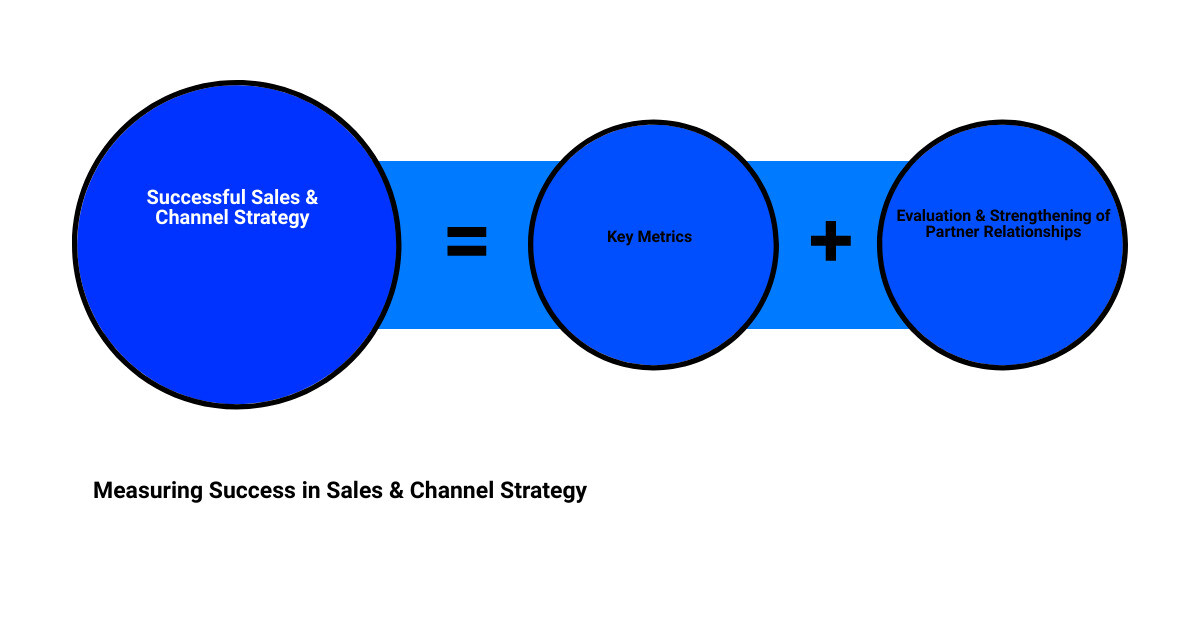In the highly competitive digital landscape, having an effective sales and channel strategy can be a game-changer for businesses. Whether you are a head of marketing at a small to midsize business, grappling with the challenges of low brand awareness, lack of high-quality leads, or the need for measurable results, understanding and implementing a competent sales and channel strategy can be your next strategic move. This approach not only addresses your key pain points but also empowers your business through engagement, setting the stage for transformative connectivity. In this article, we'll demystify the concepts of sales and channel strategy, highlighting their crucial role in driving business growth and how a strategic partner like SocialSellinator can help revolutionize your approach to these vital elements.
The Importance of Sales and Channel Strategy in Business Growth
Stepping into the world of sales and channel strategy can feel like navigating a complex maze. Still, it's a journey worth undertaking as its significance in business growth cannot be overstated. Tapping into the potential of channel sales can propel businesses towards new frontiers of success and expansion.
The Role of Channel Sales in Business Expansion
Channel sales plays an instrumental role in the expansion of businesses, small and large alike. It refers to the practice of leveraging third-party retailers, distributors, or other middlemen to sell your products or services. By doing so, you're essentially extending your reach, tapping into new markets, and getting more eyes on your brand. This strategy can significantly amplify your business growth by easing the limitations of time and resources that might have been hindering your revenue growth.
The Benefits of Channel Sales: Scaling, Market Penetration, and Cost Efficiency
Channel sales strategy is a proven way to scale your business, penetrate new markets, and save on costs. First, it allows you to reach new markets that you wouldn't be able to reach alone, thereby expanding your customer base. Second, by leveraging someone else's existing infrastructure, you can save significant time and money on building your own. Lastly, channel sales can help build trust with potential customers by allowing them to purchase from a brand they already know and trust.
The Challenges of Channel Sales: Control, Revenue Sharing, and Customer Interaction
While the advantages of channel sales are compelling, it's important to be cognizant of its challenges. Primarily, you'll need to ensure your product or service is a good fit for the retailer or distributor you're partnering with. You'll also need to navigate the complexities of different margins and fees associated with each channel. Another potential challenge is the risk of cannibalization - when customers purchase your product from a channel partner instead of directly from you, which might impact your direct sales revenue. Finally, maintaining control over your brand reputation and the quality of customer interactions can be challenging when third parties are involved.
In essence, a well-executed channel sales strategy can be a game-changer in your business growth journey. However, it requires careful planning, partner selection, and management to overcome potential challenges and reap its full benefits.
The Four Types of Sales Channels: Retail, Wholesale, Direct-to-Consumer, and B2B
When it comes to selling products or services, there are numerous ways to reach your ideal customers. Understanding the various types of sales channels can help you select the best ones for your business, ensuring you connect with your target market in the most effective way. Let's delve into the four common types of sales channels: Retail, Wholesale, Direct-to-Consumer (DTC), and B2B.
Retail Sales Channel: Direct Selling and Customer Insights
Whether online, in-store, or over the phone, retail sales involve selling products directly to the end customer. This approach gives businesses control over how to reach and sell to their customers, and provides valuable customer insights. Additionally, operating at a higher profit margin than wholesalers is a significant advantage. However, it's crucial to note that retail sales require larger marketing budgets and innovative strategies to drive traffic. Plus, retail customers often have higher expectations, and failing to meet these can damage your business.
Wholesale Sales Channel: Brand Awareness and Global Expansion
Wholesaling involves selling products in bulk to various outlets or retailers for onward sale. This channel can significantly increase brand awareness and provides a platform for faster growth and global expansion. It also enables businesses to take advantage of drop-shipping. However, maintaining control over brand identity and the brand experience can be challenging when selling in bulk. Moreover, wholesaling requires much warehouse space and large capital outlays.
Direct-to-Consumer Sales Channel: Control Over Brand Experience and Profit Margins
Direct-to-Consumer (DTC) is a sales channel where brands or manufacturers sell directly to the consumers, bypassing any middle-men. This method allows businesses to maintain control over the entire brand experience, gain deeper insights about the end users of your product, and improve profit margins. However, adopting a DTC approach may require significant investment in marketing and customer service capabilities to reach consumers directly and provide a high-quality purchasing experience.
B2B Sales Channel: Strong Client Relationships and Niche Market Opportunities
B2B, or business-to-business, is a sales channel that involves selling products or services directly to other businesses. This channel is often used when selling high-value items or when long-term contracts are involved. B2B sales often involve building strong relationships with clients, and this channel can open up opportunities in niche markets that may not be accessible through B2C channels. However, B2B sales require significant effort to build and maintain relationships and to understand the specific needs and structures of the businesses you are selling to.
In conclusion, each sales channel offers its own unique set of advantages and challenges. The key to successful channel sales strategy lies in identifying which channel aligns best with your business model, target audience, and overall business goals. It's not uncommon for businesses to leverage multiple channels to ensure they're reaching their customers in the best possible way. By understanding these key sales channels, you're one step closer to revolutionizing your sales and channel strategy.

Implementing a Successful Channel Sales Strategy
Firing up your sales engine with a new channel sales strategy is more than just choosing the right channel. It’s a meticulous process that requires planning, execution, and constant evaluation. This section will guide you through the essential steps to implementing a successful channel sales strategy that aligns with your business goals.
Assessing Business Readiness for Channel Sales
Before you dive in, it's important to assess your business's readiness for channel sales. It's like checking the condition of your vehicle before a long journey. You need to ensure your business has the resources to handle increased demand and that your sales process is effective, repeatable, and accessible enough for channel partners. Trusting potential partners with your brand reputation is a significant aspect of this readiness assessment. If you’re still refining your sales process or if the thought of entrusting your brand reputation to third parties is nerve-racking, you might want to rethink your strategy or postpone it until you're fully prepared.
Finding the Right Partners for Channel Sales
Once your business is ready to take the plunge, the next step is finding the right partners. This process is akin to lead generation and requires a thorough analysis of potential partners' capabilities and alignment with your target market. Consider factors like their customer base, existing relationships with other brands, and their capacity to add value to your product or service. Conducting thorough research and analysis can save you from potential pitfalls and ensure your selected partners align with your business goals.
Motivating and Empowering Channel Sales Partners
After finding the right partners, it's crucial to keep them motivated and empowered. This could be achieved by offering incentives like discounts or commissions on sales, exclusive access to new products, or even providing them with compelling content that showcases your product or service. Remember, the goal is to build strong, long-term relationships, not just to sell products or services.
The Role of a Channel Sales Manager in Strategy Implementation
Implementing a successful channel sales strategy also requires dedicated management. It's worth considering hiring a channel sales manager who can ensure consistency across all partners, manage different margins across channels, and make necessary adjustments to the strategy as needed. A channel sales manager can also help in building and maintaining relationships with channel partners, ensuring they have the necessary training, and that they are fully aligned with your company's sales process and objectives.
Implementing a successful channel sales strategy is a strategic move that can revolutionize your sales and lead to significant business growth. Remember, patience is key in this process. It's about building strong, long-term relationships with your channel partners and constantly refining your strategy based on performance and market trends. SocialSellinator can help you navigate this journey with expert guidance and a comprehensive approach to digital marketing and sales strategy.
The Role of Digital Marketing in Sales and Channel Strategy
In the digital age, having a robust digital marketing strategy is a crucial part of any successful sales and channel strategy. It enables businesses to reach a wider audience, engage with potential customers, and ultimately drive sales. Here we delve into the various aspects of digital marketing that can significantly enhance your sales and channel strategy.
Leveraging SEO for Targeting Potential Customers
Search Engine Optimization (SEO) plays a pivotal role in digital marketing strategy. By optimizing your website and content, you can enhance your visibility on search engines like Google, thereby attracting organic traffic. SEO involves various techniques, including keyword optimization, improving site speed, creating high-quality content, and building backlinks. A well-optimized website can help you reach more potential customers and boost your sales.
Building Customer Relationships through Social Media
Social media platforms like Facebook, Twitter, Instagram, and LinkedIn offer an effective way to engage with your audience, build your brand, and increase sales. These platforms allow you to share valuable content, respond to customer queries, and promote your products or services. Moreover, social media platforms can be used to foster long-lasting relationships with your customers, leading to increased brand loyalty and repeat business.
The Importance of a Comprehensive Digital Marketing Strategy
A comprehensive digital marketing strategy is more than just SEO and social media marketing. It also includes methods like Pay-Per-Click (PPC) advertising, content marketing, email marketing, influencer marketing, and affiliate marketing, each serving a unique purpose in the customer journey. For instance, PPC advertising can help you "buy" visits to your site, while content marketing focuses on creating and distributing valuable content to attract and engage your target audience.
Email marketing helps build customer loyalty and trust while influencer and affiliate marketing can provide credible third-party endorsements for your brand. By understanding these different types of digital marketing strategies, you can create a plan that best suits your business needs and objectives.
In the ever-evolving digital landscape, a well-rounded and adaptive digital marketing strategy is key to success. It not only helps in reaching a wider audience but also ensures that your business remains top of mind for potential customers. This combination of digital marketing techniques can significantly enhance your sales and channel strategy, leading to increased revenue and business growth.
In the next section, we will delve into how to measure the success of your sales and channel strategy. But remember, the right digital marketing strategy can revolutionize your sales efforts and set you on the path to success.

Measuring the Success of Your Sales and Channel Strategy
Stepping into the world of channel sales can feel like navigating uncharted waters. But, armed with the right tools and knowledge, you can confidently steer your ship towards success. A crucial component in this journey is the ability to measure the success of your sales and channel strategy. This involves identifying key metrics, regularly evaluating and strengthening partner relationships, and utilizing CRM tools for optimal channel sales program management.
Key Metrics for Evaluating Channel Sales Performance
Determining the effectiveness of your channel sales strategy relies on monitoring specific metrics. Some of the critical metrics to gauge your channel sales program include the total number of partners, the recruitment quota attainment, and the partner attrition rate. These measurements offer insights into your ability to establish and maintain profitable partnerships.
Furthermore, metrics like the percentage of partners recruited by channel, average cost of recruiting and onboarding a new partner, and the total number of partner deals registered, provide a clear picture of your channel partnership-building process and its cost-efficiency.
Finally, the average sales cycle length and retention rates for partner sales versus direct sales can shed light on the effectiveness of your partner training and the longevity of the relationships developed during your partner sales.
Regular Evaluation and Strengthening of Partner Relationships
Regularly evaluating your partner relationships is vital to ensure they are holding strong and address any areas that may need work. This involves looking at metrics such as the average partner satisfaction score, percentage of partners who attempted certification, and the percentage of partners who completed certification.
Building on your sales channels and nurturing your channel sales partners from the beginning can strengthen these relationships. This could involve offering market development funds, providing prepackaged campaigns, or establishing a partner advisory board. Remember, your partner will have their own business stress to manage, so staying organized and on top of what your partners need is crucial for a successful partnership.
Utilizing CRM Tools for Channel Sales Program Management
In the digital age, CRM tools are indispensable for managing your channel sales program. They provide the organization, adaptability, and clear communication required for productive partnerships. Platforms like Zendesk Sell, for instance, can manage partnerships, keep track of your sales pipeline, and integrate with hundreds of tech companies, making the transition to a new company a seamless process.
In conclusion, measuring the success of your sales and channel strategy is a multi-faceted process. It requires keeping a close eye on key metrics, regularly evaluating and strengthening partner relationships, and making the most of CRM tools. By doing so, you can ensure that your sales and channel strategy is not just afloat, but sailing towards success.
Conclusion: Revolutionizing Your Sales and Channel Strategy with SocialSellinator
Having a robust sales and channel strategy is not a luxury, but a necessity for businesses aiming to scale and penetrate new markets. It's a complex process that requires an understanding of different sales channels, finding the right partners, and constantly evaluating performance metrics. But what if there's a way to streamline this process? Enter SocialSellinator, your strategic partner in revolutionizing your sales and channel strategies.
Why SocialSellinator? For one, we understand the challenges faced by marketing heads in small to midsize businesses. From the struggle of increasing brand awareness to the quest for high-quality leads, we've got you covered. Our comprehensive suite of digital marketing services is designed to address these pain points and deliver measurable results.
Authentic engagement, that's our mantra. We believe in creating genuine interactions that lead to customer loyalty and, ultimately, sales. We're not just about superficial metrics; we're about data-driven strategies. All our campaigns are backed by analytics that can be tracked, measured, and optimized. We're all about ROI - because we understand that every dollar spent on marketing needs to show a return.
But we don't stop there. We also understand the crucial role digital marketing plays in sales and channel strategy. We leverage SEO to target potential customers, build customer relationships through social media, and ensure a comprehensive digital marketing strategy that aligns with your business objectives.
Your Sales and Channel Strategy, Reinvented With SocialSellinator, you're not just getting a service provider; you're gaining a partner that's committed to your success. We don't just implement strategies; we revolutionize them. We don't just solve problems; we transform them into opportunities for growth.
In conclusion, if you're a head of marketing or digital marketing in a small to midsize business, grappling with the challenges of sales and channel strategy, SocialSellinator isn't just an option; it's your next strategic move. So why wait? Revolutionize your sales and channel strategy with SocialSellinator. Visit our website today to elevate your digital marketing game.






